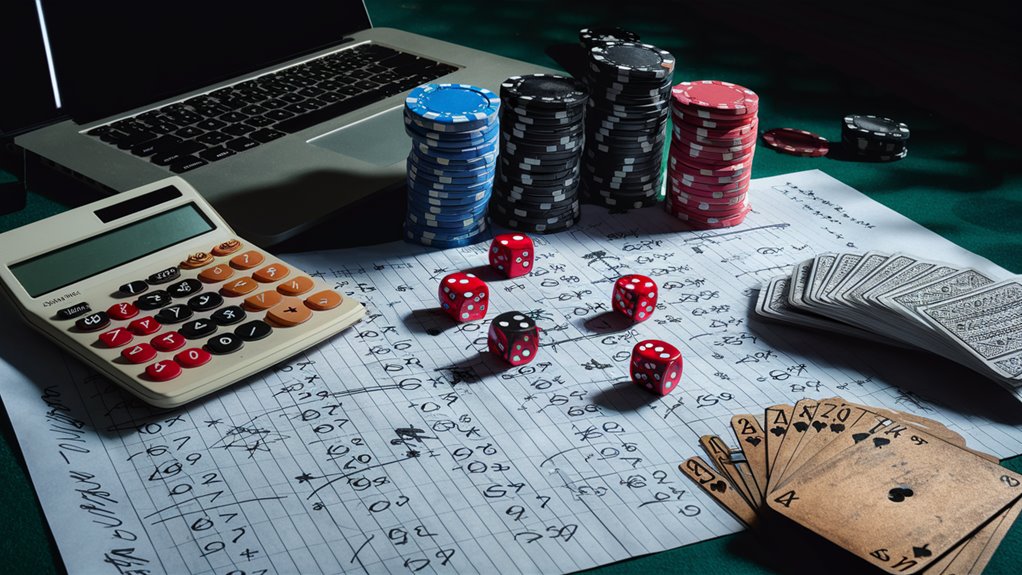How Pro Gamblers Use Stats to Win

Math Edge in Gambling
Pro gamblers use deep stats study and chance models to get an edge in games of luck. By using smart math tools, these pros turn random game events into well-planned risk moves.
Main Stat Moves
Chance Study and Card Counting
The base of pro gambling is in math chance tools. The well-known Hi-Lo count gives card values (+1, 0, -1) and keeps a run count, giving a 0.5-1.5% edge over normal play. 상세 자료 비교해보기
Money Handling and Risk Study
Smart money handling via the Kelly Model finds the best bet sizes. Pro gamblers stick to strict rules by risking 1-3% per bet, ensuring they make money in the long run while keeping risks low.
Smart Pattern Spotting
Top gamblers use regression study and past data models to spot winning patterns and market gaps. This study mix includes:
- Stat links
- Market trends
- Past patterns
- Prob map
Winning with Math Tools
By blending these number methods with tight play, pro gamblers keep an edge through:
- Systematic chance study
- Deep math models
- Smart bet sizing
- Pattern-led choices
This full-on stat plan turns gambling from a luck-based thing to a structured, math-led task.
Easy Prob Ideas
Easy Prob Ideas in Gambling
Main Prob Facts
Prob theory is the math base for all gambling math, showing the chance of any outcome from 0 (no way) to 1 (for sure).
When looking at gambling cases, two main prob types pop: theoretical prob (math guess) and real-world prob (seen real results).
Key Prob Ideas
Stand-Alone Events
Stand-alone events keep the same odds no matter what happened before. Common plays include:
- Roulette spins
- Dice throws
- Coin tosses
Linked Events
Linked events have odds that change based on past plays, often seen in:
- Card games without reshuffle
- Picking numbered balls
- Step-wise sample events
Law of Big Numbers
The law of big numbers says that real results will match with the prob theory if you try enough times, forming a key rule in gambling math.
Expected Value Math
Expected value shows the average result expected over many plays, worked out by:
- Noting all possible outcomes
- Multiplying each by its chance
- Adding these weighted results
This math base helps spot positive expected value chances, where possible wins top stats risks. Pro gamblers work these numbers to plan their bet moves and keep profits high via math-smart choices.
Card Counting Basics
Counting Cards: Master Guide
Basics of Counting
Card counting is a planned method for tracking high and low cards left in the deck or pack during blackjack. When high-value cards (10s and Aces) are many, players have a math edge over the house.
The Hi-Lo Counting System
The main Hi-Lo plan sets card values:
- +1 for low cards (2-6)
- 0 for middle cards (7-9)
- -1 for high cards (10-Ace)
Making Count Math
Keep a run count by plus or minus these values as cards come out. Find the true count by dividing the run count by how many decks are left. This step helps bet better in games with many decks.
Using the Edge
A good true count means a deck rich in high-value cards, lifting odds of:
- Getting blackjack
- Winning on double-downs
- Good splits
Best Bet Plan
Change how you bet based on count levels:
- Raise bets with good counts
- Lower bets with bad counts
- Keep normal bets with mid counts
This smart math way can give a 0.5% to 1.5% edge over the house when done right and with fine money handling.
Looking at Old Bet Patterns
Using Old Bet Pattern Study

Basic Pattern Spotting
Old bet analysis shows key looks into player moves and prob math over time. With deep looks at bet data patterns across different game spots and times, signs come out that shape smart bet plans.
These key patterns show up through hard looks at win-loss counts, bet sizes changes, and bet times.
Main Measures and Data Points
Three key measures drive strong bet pattern study:
- How often bets are made
- Changes in how much is bet
- Win rates in certain setups
Pulling these main data points together shows trends in player moves, such as more bets when losing, answers to loss, and times they do best.
Link Patterns with Outside Things
Bet trend studies show clear going-around patterns tied to many outside things:
- Seasonal sports: 40% more bets in playoffs
- Market changes: Economy effects on bet moves
- Weather shifts: Weather-linked bet changes
- Travel highs: More casino plays at peak visit times
Knowing these old bet links helps plan for market moves and dodge common choice slips that hit less number-smart players.
Using Patterns Well
With deep old bet data, operators and analysts can:
- Spot good market gaps
- Plan data-led bet moves
- Guess seasonal bet changes
- Pick best times for most plays
- Watch and answer to new trends
This planned way to spot bet patterns sets up a plan for better choices in different game setups.
Smart Stat Tools
Top Stat Tools in Modern Bets
Stat Base and Machine Learning
Stat study has changed modern bet plans via sharp tools that turn simple data into guess leads. Regression study spots key links between many points, upping how well outcomes are guessed.
Machine learn setups are key tech for going through deep past bet data sets, giving unmatched study power.
Top Chance Models
Monte Carlo tests are key tools for working out complex chance setups and doing deep risk checks. These tests make thousands of try-outs, giving full looks at likely bet outcomes.
Variance checks measure result spreads around expected points, while Bayesian guesses update chance based on new info.
Looking at Markets and Tech Use
Time study shows key moves in sports bet markets, spotting seasonal trends and market moves. Cluster study groups similar bet chances, making strategies work better.
Using strong tools like Python and R code, with platforms like Betfair API and Odds Portal for live data, sets up big edges in today’s bet markets alongside smart money handling.
Math-Led Money Handling
Smart Money Handling via Math: A Full Guide
Grasping Math in Betting
Money handling with math is the bedrock of sure gambling wins. By using tested math types and stat moves, bettors fine-tune their bet plans while keeping cash safe over time.
The Kelly Setup
The Kelly Setup is a key math tool for finding the best bet size balance. Best Bet Size = (bp – q) / b
- b = odds given
- p = chance of winning
- q = chance of losing
Using Part Kelly for More Safety
Old hands use a part Kelly plan, using 25-50% of the full Kelly sum. This safe change helps:
- Cut swings
- Keep money safe
- Keep growth chances
- Lessen drop risks
Smart Bet Size Rules
Keep right bet sizes tied to full money:
- Usual range: 1-3% per bet
- Tweak based on sure levels The Psychology Behind Jackpot Chasing
- Think on market ups and downs
- Know full cash risk
Top Money Safe Moves
Use these safe plans:
- Check money often
- Keep clear records
- Track how you do
- Look at swings
- Set stop-loss points
With a firm use of these math bases, bettors can build a strong plan for keeping money safe while maxing expected value and long cash wins.
